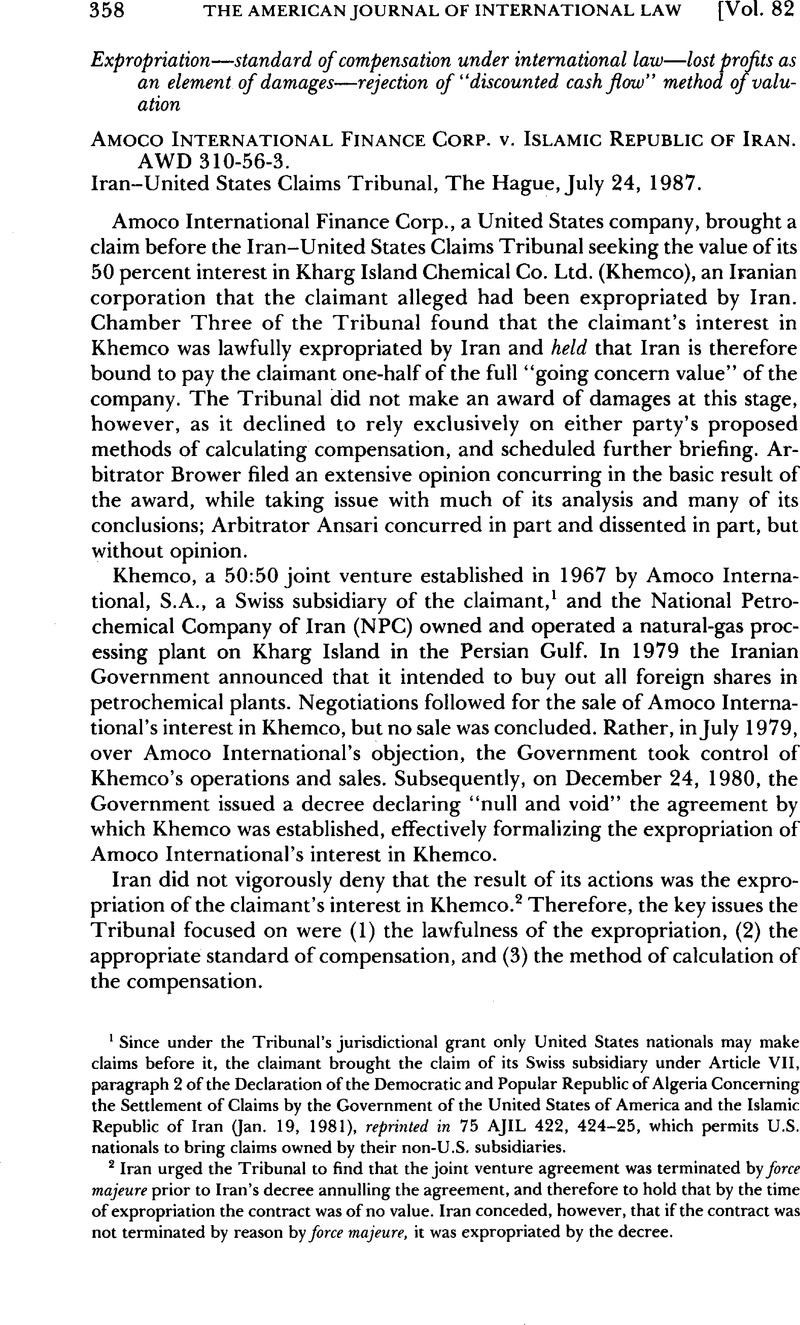No CrossRef data available.
Published online by Cambridge University Press: 27 February 2017

1 Since under the Tribunal’s jurisdictional grant only United States nationals may make claims before it, the claimant brought the claim of its Swiss subsidiary under Article VII, paragraph 2 of the Declaration of the Democratic and Popular Republic of Algeria Concerning the Settlement of Claims by the Government of the United States of America and the Islamic Republic of Iran (Jan. 19, 1981), reprinted in 75 AJIL 422, 424–25, which permits U.S. nationals to bring claims owned by their non–U.S. subsidiaries.
2 Iran urged the Tribunal to find that the joint venture agreement was terminated by force majeure prior to Iran’s decree annulling the agreement, and therefore to hold that by the time of expropriation the contract was of no value. Iran conceded, however, that if the contract was not terminated by reason by force majeure, it was expropriated by the decree.
3 The claimant alleged alternatively that if Khemco was not expropriated by Iran in July 1979, then NPC certainly breached its joint venture agreement with Amoco International by which Khemco was owned and operated. The Tribunal found that NPC was not liable for breach because, in excluding Amoco International from management and profits, NPC had “acted as an instrument of the Iranian Government.” AWD 310-56-3, slip op., para. 174. The Tribunal concluded that therefore the alleged breach must be considered not as a separate cause of action but as part of the expropriation claim. Id., para. 177.
4 Treaty of Amity, Economic Relations, and Consular Rights, U.S.–Iran, Aug. 15, 1955, 284 UNTS 93, TIAS No. 3853, 8 UST 899.
5 Slip op., para. 181.
6 Id., para. 132. Nevertheless, the Tribunal determined that in order to recognize the reality of the claimant’s situation as of July 31, 1979, that date would be used as the date of valuation of Khemco for purposes of determining compensation. Id., para. 181.
7 Id., para. 132. The contract was nullified pursuant to the Single Article Act Concerning the Nationalization of the Oil Industry of Iran, promulgated in January 1980 by Iran’s Revolutionary Council.
8 The Single Article Act pursuant to which the decree of annulment was made provides that “claims arising from conclusion and execution of [annulled] agreements shall be settled by the decision of [‘a special commission appointed by the Minister of Oil’].”
9 Slip op., para. 137. 10 Id., para. 173.
11 The Tribunal rejected as factually unsubstantiated contentions that the nationalization was discriminatorily aimed at only American interests, and that it was not for a public purpose. Id.
12 Factory at Chorzów (Ger. v. Pol.), 1928 PCIJ (ser. A) No. 17 (Judgment of Sept. 13).
13 Slip op., para. 192.
14 Id., para. 196 (quoting 1928 PCIJ (ser. A) No. 17, at 47).
The Tribunal also held that the Treaty of Amity would govern the standard of compensation only of a lawful expropriation, since “[a] nationalization in breach of the Treaty . . . would render applicable the rules relating to State responsibility, which are to be found not in the Treaty but in customary law.” Id., para. 189.
15 Id., paras. 201–04.
16 Id., paras. 263–64.
17 Id., para. 255.
18 Id., para. 227.
19 Id., para. 229.
20 Id., para. 230.
21 Id., para. 267.
22 SEDCO, Inc. v. National Iranian Oil Co., ITL 59-129-3 (Mar. 27, 1986) (Chamber 3), reprinted in 25 ILM 629 (1986), summarized in 80 AJIL 969 (1986); Tippetts, Abbett, McCarthy, Stratton v. TAMS-AFFA Consulting Engineers of Iran, AWD 141-7-2 (June 29, 1984) (Chamber 2), reprinted in 6 Iran-U.S. Claims Tribunal Rep. [hereinafter Iran-U.S. C.T.R.] 219 (1984 II); American International Group, Inc. v. Islamic Republic of Iran, AWD 93-2-3 (Dec. 19, 1983) (Chamber 3), reprinted in 4 Iran-U.S. C.T.R. 96 (1983 III).
23 See, e.g., Starrett Housing Corp. v. Islamic Republic of Iran, AWD 314-24-1 (Aug. 14, 1987) (Chamber 1) (no distinction made as to lawfulness of the expropriation); see id., Concurring Opinion of Arbitrator Holtzmann, slip op. at 6; SEDCO, Inc. v. National Iranian Oil Co., supra note 22, slip op. at 13 (full value to be awarded “regardless of whether or not the expropriation was otherwise lawful”).
The award can also be faulted for its reasons for finding this particular taking to have been lawful. The holding of lawfulness depended heavily upon the Tribunal’s finding that the expropriation was supported by Iranian legislative authority and that adequate provision for “just compensation” had been made at the time of taking. Since the legislation and the claims procedure appeared many months after the Government had exercised actual and exclusive control over Khemco’s operations and sales, the Tribunal had to ignore its own precedents that such control, when unequivocal and unrevoked, amounts to expropriation. See SEDCO, Inc. v. National Iranian Oil Co., ITL 55-129-3 (Oct. 28, 1985) (Chamber 3), reprinted in 9 Iran-U.S. C.T.R. 248, 274–75 (1985 II) (expropriation occurs when actual de facto control is exercised over entity, not when later formalized); accord Foremost Tehran, Inc. v. Islamic Republic of Iran, ITL 1-220-37/231-1 (Apr. 11, 1986) (Chamber 1), slip op. at 22; Phelps Dodge Corp. v. Islamic Republic of Iran, AWD 217-99-2 (Mar. 19, 1986) (Chamber 2), slip op. at 12–14. Further, as pointed out in Arbitrator Brower’s concurring opinion, the claims procedure did not in fact offer much hope of just compensation, as all settlements reached pursuant to it were based on net book value, a standard the award rejects as below the requirements of international law. See AWD 310-56-3, Concurring Opinion of Arbitrator Brower, slip op., para. 8.
24 See, e.g., American International Group, Inc., supra note 22, 4 Iran-U.S. C.T.R. at 109–10 (expropriation lawful; lost profits awarded); Payne v. Islamic Republic of Iran, AWD 245-335-2 (Aug. 8, 1986) (Chamber 2) (expropriation not found unlawful; lost profits awarded).
25 Starrett Housing Corp., supra note 23.
26 Id., slip op., para. 279.